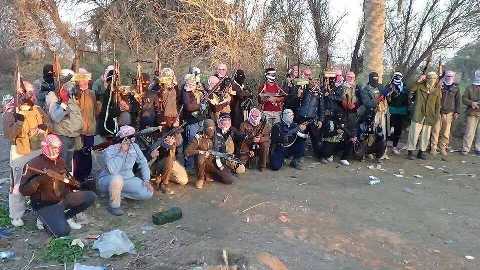by Middle East Monitor on 13-03-2014
The council of Al-Anbar Tribes in Iraq has refused any initiative to resolve the ongoing conflict, which started several months ago, without full withdrawal of the Iraqi army from Al-Anbar cities.

 In a statement, the tribes said that they would not lay their weapons down unless all their demands were fulfilled, including the release of the parliamentarian Ahmed Al-Alwani and all prisoners, as well as dismantling pro-government militias.
In a statement, the tribes said that they would not lay their weapons down unless all their demands were fulfilled, including the release of the parliamentarian Ahmed Al-Alwani and all prisoners, as well as dismantling pro-government militias.
Calling for the Kurdish leadership to disengage from the government coalition, the tribes' leaders, who met in the house of Sheikh Ali Al-Hatem, warned the sectarian war carried out by the Shia Prime Minister Nouri Al-Maliki would target the Sunni Kurds after the Sunni Arabs.
Meanwhile, the pro-government council of Al-Anbar governorates has criticised the army because of its continuous shelling of Al-Anbar cities and not giving a chance for peaceful solutions. The council described the situation in Fallujah as "disastrous" because of the government's blockade.
The council denied reaching any agreement with Sheikh Al-Hatem regarding the Fallujah crisis, saying that Al-Hatem is not the only tribal leader in the city.
The Parliamentarian Hamid Al-Motlaq from Al-Anbar described the situation in Fallujah as "disastrous" and reiterated that bombings, targeting residential areas and civilians, are ongoing.
Al-Motlaq said Fallujah suffers from severe shortage of food and medicines. He also said that the displaced experience "very bad" living conditions while Iraqis in all the cities of Al-Anbar are living fear. He blamed the government for this situation.
Witnesses said that a large number of schools in Al-Ramadi are still closed and all schools in Fallujah are closed. Witnesses also said that the main hospital in Fallujah was targeted by 20 mortar missiles; one of them hit the ICU and the operations hall.
Efforts to stop the bloodshed in Al-Anbar governorates have increased. Observers believe that all initiatives fail because of the increasing gap between the legislative and executive authorities; each has ignored the role of the other.
Observers have warned that Iraq may be heading towards, what the US occupation aimed to achieve, a comprehensive sectarian war between Sunnis and Shias.
No comments:
Post a Comment